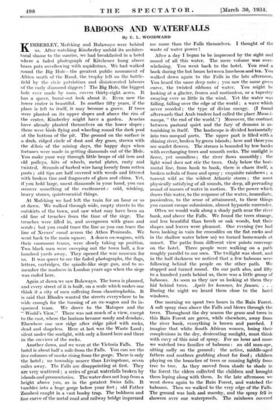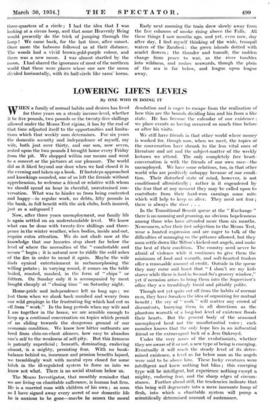BABOONS AND WATERFALLS
By E. L. WOODWARD KIMBERLEY, Mafeking and Bulawayo were behind us. After watching Kimberley unfold its architec- tural shame to the sunrise, we had breakfasted in a hotel where a faded photograph of Kitchener hung above brass pots overflowing with aspidistras. We had walked round the Big Hole—the greatest public monument of. Africa south of the Rand, the trophy left on the battle- field by the civic patriotism and disinterested labours of the early diamond diggers ! The Big Hole, the biggest hole ever made by man, covers thirty-eight acres. It has a queer, burnt-out look about it. Even now the lower crater is beautiful. In another fifty years, if the place is left to itself, it may become a grove. If trees- were planted on its upper slopes and above the rim of the crater, Kimberley might have a garden. Acacias have already planted themselves on the lower slopes ; KIMBERLEY, Mafeking and Bulawayo were behind us. After watching Kimberley unfold its architec- tural shame to the sunrise, we had breakfasted in a hotel where a faded photograph of Kitchener hung above brass pots overflowing with aspidistras. We had walked round the Big Hole—the greatest public monument of. Africa south of the Rand, the trophy left on the battle- field by the civic patriotism and disinterested labours of the early diamond diggers ! The Big Hole, the biggest hole ever made by man, covers thirty-eight acres. It has a queer, burnt-out look about it. Even now the lower crater is beautiful. In another fifty years, if the place is left to itself, it may become a grove. If trees- were planted on its upper slopes and above the rim of the crater, Kimberley might have a garden. Acacias have already planted themselves on the lower slopes ; • there were birds flying and wheeling round the dark pool at the bottom of the pit. The ground on the surface is a drab, ridged circle of dust and dry grass, strewn with the -debris of the mining days, the happy days when fortunes were made in getting diamonds out of the Hole. You make your way through little heaps of old iron and old pulleys, bits of wheels, metal plates, rusty and twisted. Strands of barbed wire hang loosely from rotten Posts ; old tips are half covered with weeds and littered with broken tins and fragments of -glass and china. Yet, if you hold large, uncut diamonds in your hand, you can recover something of the excitement : cold, winking, heavy stones, quintessential things.
At Mafeking we had left the train for an hour or so at dawn. We walked through wide, empty streets to the outskirts of the town, and saw what may have been an old line of trenches from the time of the siege. The trenches were filled in, and overgrown with grass and scrub ; but you could trace the line as you can trace the line of Xerxes' canal across the Athos Peninsula. We went back to the main square. A dozen ox-wagons, with their enormous teams, were slowly taking up position. Two black men were sweeping Out the town hall, a few hundred yards away. They opened the war museum for us. It was queer to see the faded photographs, the flags, letters, cartridges, the spindle-like siege gun, and to re- member the madness in London years ago when the siege was ended here.
Again at dawn we saw Bulawayo. The town is planned, and every street of it is built, on a scale which makes one think it a city of men suffering from claustrophobia. It is said that Rhodes wanted the streets everywhere to be wide enough for the turning of an ox-wagon and its in- spanned team. We drove to the Matopos and the "- World's View." There was not much of a view, except to the east, where the horizon became sandy and desolate. Elsewhere one saw ridge after ridge piled with rocks, dead and shapeless. Here at last was the Waste Land ; silent under the sunlight, with only a lizard here and there in the crevices of the rocks.
Another dawn, and we were at the Victoria Falls. The hotel is about half a mile from the Falls. You can see the five columns of smoke rising froni the gorge. There is only the hotel ; no township nearer than Livingstone, seven miles away. The Falls are disappointing at first. They are very scattered ; a series of great waterfalls broken by islands and promontories. The water does not leap from a height above you, as in the greatest Swiss falls. It tumbles into a huge gorge below your feet ; old Father Zambesi caught in a vast booby trap. The boldness and fine curve of the-metal road and railway bridge impressed me more than the Falls themselves. I thought of the waste of water power I After a day I began- to be impressed by the sight and sound of all this water. The mere, volume was over- whelming. You went back to the hotel. You read a book during the hot hours between luncheon and tea. - You walked down again to the Falls in the late afternoon. You heard the same deep note ; you saw the same green curve, the twisted ribbons of water. You might be looking at a glacier, frozen and motionless, or a tapestry swaying ever so little in the wind. Yet the water was falling, falling over the edge of the world ; a wave which never receded ; the type of divine energy. (I found afterwards that Arab traders had called the place Musa-i- nunya, " the end of the world.") Moreover, the contrast between pastoral quiet and the fury of demons is as- tonishing in itself. The landscape is divided horizontally into two unequal parts. The upper part is filled with a shining river, broken by green islands; here and there you see scarlet flowers. The stream is bounded by low banks with overhanging trees and smooth rocks. The sunlight is fierce, yet soundless ; the river flows smoothly ; the light wind does not stir the trees. Only below the hori- zontal line, from bank to bank, there is chaos itself, a broken nebula of foam and spray ; exquisite rainbows ; a torrent wild as the wildest Atlantic storm ; the most physically satisfying of all sounds, the deep, all-pervading sound of masses of water in motion. To the power which draws this water, to the response of the water, immediate, passionless, to the sense of attainment, to these things you cannot escape submission, almost hypnotic surrender.
Often we would walk along a shady path near the river bank, and above the Falls. We found the trees strange, and less beautiful than beech or oak woods, but their shapes and leaves were pleasant. One evening (we had been looking in vain for crocodiles on the flat rocks and in the shallow water below us) we turned homewards at sunset. The paths from different view points converge on the hotel. Three people were walking on a path roughly parallel to our own. The twilight was short, and in the half darkness we noticed that a few baboons were following behind the people on the other path. We stopped and turned round. On our path also, and fifty to a hundred yards behind us, there was a little group of baboons. As soon as they saw us looking at them they hid behind trees. Apris les hommes, les fauns. . . . During the night we heard them close to the hotel windows.
One morning we spent two hours in the Rain Forest. A soft spray rises above the Falls and blows through the trees. Throughout the dry season the grass and trees in this Rain Forest are green, while elsewhere, away from the river bank, everything is brown and parched. I imagine that white South African women, losing their complexions in the dry, desiccating sunlight, must think with envy of this mist of spray. For an hour and more we watched two families of baboons : an old man-ape, sitting sadly on the ground ; the active, middle-aged fathers and mothers grubbing about for food ; children playing on the branches of trees or running lightly from tree to tree. As they moved from shade to shade in the forest the elders collected the children and brought them loping along with them. In the late afternoon we went down again to the Rain Forest, and watched the baboons. Then we walked to the very edge of the Falls. The ground was lush and marshy, and the spray fell in showers over our waterproofs. The rainbows covered three-quarters o£ a circle ; I had the idea that I was looking at a circus hoop, and that some Heavenly Being would presently do the trick of jumping through the hoop ! We came back, for the last time, after sunset. Once more the baboons followed us at their distance. The woods had a vivid brown-gold-purple colour, and there was a new moon. I was almost startled by the moon. I had shared the ignorance of most of the northern world that these were places where one saw the moon divided horizontally, with its half-circle like rams' horns. Early next morning the train drew slowly away from the five columns of smoke rising above the Falls. All these things I saw months ago, and yet, even now, day after day, I find myself thinking of the wide, tranquil waters of the Zambesi ; the green islands dotted with scarlet flowers ; the thunder and tumult, the sudden change from peace to war, as the river tumbles into wildness, and rushes seawards, thoUgh the plain of the sea is far below, and league upon league away.









































 Previous page
Previous page